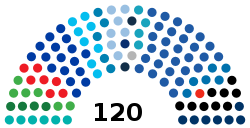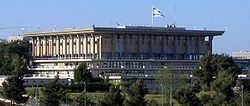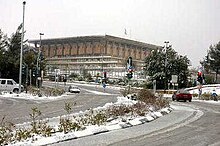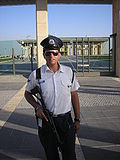What Is The Makeup Of The Isreali Knesset
| The Knesset הכנסת HaKnesset | |
|---|---|
| 24th Knesset | |
 | |
| Type | |
| Type | Unicameral |
| Leadership | |
| Speaker | Mickey Levy, Yesh Atid |
| Prime Government minister | Naftali Bennett, Yamina |
| Alternate Prime Minister | Yair Lapid, Yesh Atid |
| Leader of the Opposition | Benjamin Netanyahu, Likud |
| Structure | |
| Seats | 120 |
 | |
| Political groups | Government (60)[ane]
Opposition (threescore)
|
| Elections | |
| Voting organisation | Closed list proportional representation D'Hondt method |
| Final ballot | 23 March 2021 |
| Next ballot | eleven November 2025 |
| Meeting place | |
 | |
| Knesset, Givat Ram, Jerusalem | |
| Website | |
| Official website | |

Political Organisation of Israel
The Knesset (Hebrew: הַכְּנֶסֶת [haˈkneset] ( ![]() listen ); lit. "gathering"[2] or "associates") is the unicameral legislature of State of israel. Equally the supreme state body, the Knesset is sovereign and thus has complete control of the entirety of the Israeli government (with the exception of checks and balances from the courts and local governments).
listen ); lit. "gathering"[2] or "associates") is the unicameral legislature of State of israel. Equally the supreme state body, the Knesset is sovereign and thus has complete control of the entirety of the Israeli government (with the exception of checks and balances from the courts and local governments).
The Knesset passes all laws, elects the president and prime government minister (although the latter is ceremonially appointed by the President), approves the chiffonier, and supervises the work of the regime, amid other things. In add-on, the Knesset elects the state comptroller. It as well has the power to waive the immunity of its members, remove the president and the land comptroller from part, deliquesce the government in a constructive vote of no confidence, and to dissolve itself and phone call new elections. The prime government minister may too deliquesce the Knesset. Even so, until an election is completed, the Knesset maintains dominance in its electric current composition.[3] The Knesset meets in Givat Ram, Jerusalem.
Proper name
The term "Knesset" is derived from the ancient Knesset HaGdola (Hebrew: כְּנֶסֶת הַגְּדוֹלָה) or "Corking Associates", which according to Jewish tradition was an assembly of 120 scribes, sages, and prophets, in the catamenia from the end of the Biblical prophets to the fourth dimension of the evolution of Rabbinic Judaism – about two centuries catastrophe c. 200 BCE.[four] At that place is, however, no organisational continuity and aside from the number of members, there is little similarity, as the ancient Knesset was a religious, completely unelected torso.
Members
Members of the Knesset are known in Hebrew equally חֲבֵר הַכְּנֶסֶת (Haver HaKnesset), if male, or חַבְרַת הַכְּנֶסֶת (Havrat HaKnesset), if female person.
Role in Israeli government
As the legislative branch of the Israeli government, the Knesset passes all laws, elects the president, approves the cabinet, and supervises the work of the government through its committees. It also has the ability to waive the immunity of its members, remove the President and the State Comptroller from office, and to dissolve itself and call new elections.
The Knesset has de jure parliamentary supremacy, and can pass whatsoever law past a elementary majority, even i that might arguably conflict with the Basic Laws of Israel, unless the basic law includes specific conditions for its modification; in accordance with a programme adopted in 1950, the Basic Laws can be adopted and amended by the Knesset, interim in its capacity equally a Elective Associates.[5] The Knesset itself is regulated by a Basic Law called "Basic Law: the Knesset".
In improver to the absence of a formal constitution, and with no Bones Law thus far existence adopted which formally grants a power of judicial review to the judiciary, the Supreme Court of Israel has since the early on 1990s asserted its authority, when sitting as the High Court of Justice, to invalidate provisions of Knesset laws it has found to be inconsistent with Basic Constabulary.[five] The Knesset is presided over by a Speaker and Deputy Speakers, chosen the Knesset Presidium, which currently consists of:[vi]
| Position | Proper noun | Faction | Party |
|---|---|---|---|
| Speaker | Mickey Levy | Yesh Atid | Yesh Atid |
| Deputy | Mansour Abbas | United Arab Listing | United Arab Listing |
| Deputy | David Bitan | Likud | Likud |
| Deputy | Eitan Ginzburg | Blue and White | Resilience |
| Deputy | Yakov Margi | Shas | Shas |
Committees
The Knesset is divided into committees, which better bills on various appropriate subjects. Committee chairpersons are called by their members, on recommendation of the House Committee, and their factional limerick represents that of the Knesset itself. Committees may elect sub-committees and delegate powers to them, or establish joint committees for issues concerning more than one commission. To further their deliberations, they invite authorities ministers, senior officials, and experts in the matter being discussed. Committees may request explanations and data from any relevant ministers in any matter within their competence, and the ministers or persons appointed by them must provide the caption or data requested.[three]
In that location are four types of committees in the Knesset. Permanent committees amend proposed legislation dealing with their area of expertise, and may initiate legislation. All the same, such legislation may merely deal with Basic Laws and laws dealing with the Knesset, elections to the Knesset, Knesset members, or the Country Comptroller. Special committees function in a similar manner to permanent committees, simply are appointed to bargain with item manners at paw, and can be dissolved or turned into permanent committees. Parliamentary inquiry committees are appointed past the plenum to bargain with issues viewed as having special national importance. In addition, there are two types of committees that convene simply when needed: the Interpretations Committee, made up of the Speaker and eight members chosen past the House Commission, deals with appeals against the interpretation given by the Speaker during a sitting of the plenum to the Knesset rules of procedure or precedents, and Public Committees, established to bargain with problems that are connected to the Knesset.[7] [viii]
Permanent committees:
- House Commission
- Finance Committee
- Economic Diplomacy Committee
- Foreign Affairs and Defense Commission
- Interior and Environment Committee
- Clearing, Absorption, and Diaspora Affairs Commission
- Education, Culture, and Sports Committee
- Constitution, Police force, and Justice Committee
- Labour, Welfare, and Health Committee
- Science and Engineering science Committee
- State Control Committee
- Committee on the Status of Women
Special committees:
- Commission on Drug Abuse
- Committee on the Rights of the Child
- Committee on Foreign Workers
- Israeli Central Elections Committee
- Public Petitions Committee
The other committees are the Arrangements Commission and the Ethics Commission. The Ethics Commission is responsible for jurisdiction over Knesset members who violate the rules of ethics of the Knesset, or are involved in illegal activities outside the Knesset. Within the framework of responsibility, the Ethics Committee may place various sanctions on a member, only is non allowed to restrict a member'southward correct to vote. The Arrangements Committee proposes the makeup of the permanent committees following each ballot, besides every bit suggesting committee chairs, lays down the sitting arrangements of political parties in the Knesset, and the distribution of rooms in the Knesset building to members and parties.[9]
Caucuses
Knesset members often join in formal or informal groups known equally "lobbies" or "caucuses", to advocate for a item topic. There are hundreds of such caucuses in the Knesset. The Knesset Christian Allies Caucus and the Knesset Country of Israel Caucus are ii of the largest and well-nigh active caucuses.[x] [11]
Size

The Knesset numbers 120 members, after the size of the Great Associates. The discipline of Knesset membership has oftentimes been a cause for proposed reforms. Under the Norwegian Law, Knesset members who are appointed to ministerial positions are allowed to resign and allow the next person on their party's list to have their seat. If they exit the cabinet, they are able to return to the Knesset to take the place of their replacement.
Elections
The 120 members of the Knesset (MKs)[12] are popularly elected from a single nationwide balloter district to concurrent four-year terms, subject to calls for early elections (which are quite common). All Israeli citizens 18 years or older may vote in legislative elections, which are conducted by secret election.
Knesset seats are allocated amidst the diverse parties using the D'Hondt method of party listing proportional representation. A party or electoral alliance must pass the election threshold of 3.25%[thirteen] of the overall vote to be allocated a Knesset seat. Parties select their candidates using a closed list. Thus, voters select the party of their selection, non any specific candidate.
The electoral threshold was previously set at 1% from 1949 to 1992, and so one.5% from 1992 to 2003, then 2% until March 2014 when the current threshold of iii.25% was passed (effective with elections for the 20th Knesset).[xiv] As a result of the low threshold, a typical Knesset has x or more factions represented. With so many parties, it is nigh impossible for ane political party or faction to govern alone, permit solitary win a majority. No party or faction has ever won the 61 seats necessary for a majority; the closest beingness the 56 seats won by the Alignment in the 1969 elections (the Alignment had briefly held 63 seats going into the 1969 elections afterward beingness formed shortly beforehand by the merger of several parties, the only occasion on which any political party or faction has ever held a majority). Every Israeli government has been a coalition of ii or more parties.
After an election, the president meets with the leaders of every party that won Knesset seats and asks them to recommend which party leader should form the government. The president and so nominates the party leader who is nigh likely to command the support of a majority in the Knesset (though not necessarily the leader of the largest party/faction in the chamber). The prime number government minister-designate has 42 days to put together a viable coalition (extensions can be granted and often are), and and then must win a vote of confidence in the Knesset before taking part.
Current composition
The table below lists the parliamentary factions represented in the 24th Knesset.
| Name | Credo | Symbol | Main demographic | Leader | 2021 result | As of June 2021 | ||
|---|---|---|---|---|---|---|---|---|
| Votes (%) | Seats | |||||||
| Likud | National liberalism | מחל | – | Benjamin Netanyahu | 24.19% | 30 / 120 | 29 / 120 | |
| Yesh Atid | Liberalism | פה | – | Yair Lapid | 13.93% | 17 / 120 | 17 / 120 | |
| Shas | Religious conservatism | שס | Sephardi and Mizrahi Haredim | Aryeh Deri | vii.17% | 9 / 120 | 9 / 120 | |
| Blueish and White | Social liberalism | כן | – | Benny Gantz | 6.63% | eight / 120 | eight / 120 | |
| Yamina | National conservatism | ב | – | Naftali Bennett | 6.21% | 7 / 120 | half dozen / 120 | |
| Labor | Social democracy | אמת | – | Merav Michaeli | 6.09% | 7 / 120 | 7 / 120 | |
| United Torah Judaism | Religious conservatism | ג | Ashkenazi Haredim | Moshe Gafni | five.63% | 7 / 120 | 7 / 120 | |
| Yisrael Beiteinu | Nationalism Secularism | ל | Russian-speakers | Avigdor Lieberman | 5.63% | 7 / 120 | 7 / 120 | |
| Religious Zionist | Religious Zionism | ט | Israeli settlers, Mod Orthodox and Hardal Jews | Bezalel Smotrich | 5.12% | 6 / 120 | 7 / 120 | |
| Joint List | Big tent Minority interests | ודעם | Israeli Arabs | Ayman Odeh | iv.82% | 6 / 120 | vi / 120 | |
| New Promise | National liberalism | ת | – | Gideon Sa'ar | 4.74% | 6 / 120 | vi / 120 | |
| Meretz | Progressivism | מרצ | – | Nitzan Horowitz | 4.59% | six / 120 | 6 / 120 | |
| Ra'am | Islamic commonwealth | עם | Israeli Arab Sunni Muslims, Negev Bedouin | Mansour Abbas | 3.79% | four / 120 | 4 / 120 | |
| Independent | - | - | Amichai Chikli | N/A | 1 / 120 | |||
Functioning
Despite numerous motions of no confidence being tabled in the Knesset, a government has only been defeated by i in one case,[xv] when Yitzhak Shamir's government was brought down on xv March 1990 as part of a plot that became known equally "the dirty trick" (Hebrew: התרגיל המסריח, HaTargil HaMasriaḥ, lit. "the stinking trick").
However, several governments have resigned every bit a event of no-confidence motions, fifty-fifty when they were not defeated. These include the 5th government, which fell subsequently Prime Government minister Moshe Sharett resigned in June 1955 following the abstention of the General Zionists (part of the governing coalition) during a vote of no-conviction;[16] the ninth government, which savage after Prime Minister Ben-Gurion resigned in January 1961 over a motility of no-confidence on the Lavon Affair;[17] and the seventeenth government, which resigned in December 1976 after the National Religious Party (role of the governing coalition) abstained in a move of no-confidence against the regime.
History

The Knesset kickoff convened on 14 February 1949 in Tel Aviv post-obit the twenty January elections, replacing the Provisional State Quango which acted equally Israel's official legislature from its date of independence on 14 May 1948 and succeeding the Assembly of Representatives that had functioned as the Jewish community's representative torso during the Mandate era.[18]
The Knesset compound sits on a hilltop in western Jerusalem in a district known every bit Sheikh Badr before the 1948 Arab–Israeli War, now Givat Ram. The main building was financed by James de Rothschild as a gift to the State of israel in his will and was completed in 1966. It was built on land leased from the Greek Orthodox Patriarchate of Jerusalem.[xix] Over the years, significant additions to the construction were constructed, however, these were built at levels below and backside the main 1966 structure as non to detract from the original associates building's appearance.
Before the construction of its current location, the Knesset met in Tel Aviv,[xviii] before moving to the Froumine building in Jerusalem.[20]
Location and construction timeline

- 14 February 1949: Commencement coming together of the Constituent Assembly, Jewish Agency, Jerusalem
- 16 Feb 1949: Name "Knesset" canonical for the Constituent Assembly; number of members fixed at 120; the Knesset starts convening in Tel Aviv (first as at what is at present the Opera Tower, afterward at the San Remo Hotel in Tel Aviv)[21]
- 26 December 1949 – 8 March 1950: Knesset moved to Jerusalem; kickoff convened at the Jewish Agency building
- 13 March 1950: Knesset moved to the Froumine House, in Male monarch George Street, Jerusalem[21]
- 1950–1955: Israeli regime holds architectural competitions for the permanent Knesset edifice. Ossip Klarwein'due south original blueprint won the competition
- 1955: Government approves plans to build the Knesset in its current location
- 1957: James de Rothschild informs Prime Minister David Ben-Gurion of his desire to finance the structure of the building
- fourteen October 1958: Cornerstone-laying for new Knesset building
- 30 August 1966: Dedication of new building (during the sixth Knesset)
- 1981: Construction of new wing begins
- 1992: New wing opens
- 2001: Construction starts on a big new fly that substantially doubles the overall floorspace of the Knesset compound.
- 2007: New large wing opens
Knesset assemblies
Each Knesset session is known by its election number. Thus the Knesset elected by Israel's first election in 1949 is known as the First Knesset. The electric current Knesset, elected in 2021, is the Twenty-quaternary Knesset.
- Showtime Knesset (1949–1951)
- Second Knesset (1951–1955)
- 3rd Knesset (1955–1959)
- Quaternary Knesset (1959–1961)
- Fifth Knesset (1961–1965)
- Sixth Knesset (1965–1969)
- Seventh Knesset (1969–1974)
- 8th Knesset (1974–1977)
- Ninth Knesset (1977–1981)
- Tenth Knesset (1981–1984)
- Eleventh Knesset (1984–1988)
- Twelfth Knesset (1988–1992)
- Thirteenth Knesset (1992–1996)
- Fourteenth Knesset (1996–1999)
- Fifteenth Knesset (1999–2003)
- Sixteenth Knesset (2003–2006)
- Seventeenth Knesset (2006–2009)
- Eighteenth Knesset (2009–2013)
- Nineteenth Knesset (2013–2015)
- Twentieth Knesset (2015–2019)
- Twenty-first Knesset (2019)
- 20-second Knesset (2019–2020)
- Twenty-third Knesset (2020-2021)
- Twenty-4th Knesset (2021-)
Tourism
The Knesset holds morn tours in Hebrew, Standard arabic, English, French, Castilian, German, and Russian on Sun and Thursday, and there are also live session viewing times on Monday, Tuesday, and Wed mornings.[22]
Security

A member of the Knesset Guard
The Knesset is protected by the Knesset Guard, a protective security unit responsible for the security of the Knesset edifice and Knesset members. Guards are stationed outside the building to provide armed protection, and ushers are stationed inside to maintain order. The Knesset Guard also plays a ceremonial role, participating in state ceremonies, which includes greeting dignitaries on Mount Herzl on the eve of Israeli Independence Day.
Public perception
A poll conducted by the Israeli Commonwealth Found in Apr and May 2014 showed that while a majority of both Jews and Arabs in State of israel are proud to be citizens of the state, both groups share a distrust of Israel's regime, including the Knesset. Almost iii quarters of Israelis surveyed said corruption in Israel'south political leadership was either "widespread or somewhat prevalent". A majority of both Arabs and Jews trusted the Israel Defence force Forces, the President of Israel, and the Supreme Court of Israel, but Jews and Arabs reported similar levels of mistrust, with little more a third of each group challenge conviction in the Knesset.[23]
See besides
- Dandy Associates
- Elections in Israel
- Politics of State of israel
- Knesset Guard
- List of Arab members of the Knesset
- Lists of Knesset members
- Listing of Knesset speakers
- Listing of legislatures by state
Notes
References
- ^ "State of israel's Knesset to vote on new regime, end Netanyahu's reign". Al Jazeera. 13 June 2021. Retrieved xiii June 2021.
- ^ The Oxford Dictionary of English language, Oxford University Press, 2005
- ^ a b The Knesset. Jewishvirtuallibrary.org. Retrieved 8 September 2011.
- ^ Synagogue, The Great (Heb. כְּנֶסֶת הַגְּדוֹלָה, Keneset ha-Gedolah) Jewish Virtual Library
- ^ a b "Basic Laws - Introduction". Knesset. Retrieved v March 2010.
- ^ Key Roles in the (24th) Knesset, Knesset website
- ^ Legislation. Knesset.gov.il. Retrieved viii September 2011.
- ^ Knesset Committees. Knesset.gov.il. Retrieved viii September 2011.
- ^ The Organisation of the Work of the Knesset. Knesset.gov.il (17 February 2003). Retrieved 8 September 2011.
- ^ "Lobbies of the Twentieth Knesset". knesset.gov.
- ^ Ahren, Raphael (11 June 2013). "Coalition chief heading caucus that seeks to retain entire West Bank". The Times of Israel.
Knesset caucuses, sometimes called lobbies, are informal groups of parliamentarians that assemble effectually a certain crusade or topic. In that location are hundreds of such caucuses, but the 1 Levin and Strock now head is one of the largest — if non the largest, with twenty-30 members in the last Knesset — and most active.
- ^ "All 120 incoming Knesset members". The Times of Israel . Retrieved half dozen June 2017.
- ^ www.knesset.gov.il
- ^ Lis, Jonathan (12 March 2014). "Israel raises electoral threshold to 3.25 per centum". Haaretz . Retrieved 8 January 2015.
- ^ The Plenum - Motions of No-Confidence Knesset website
- ^ Factional and Government Make-Up of the 2d Knesset Knesset website
- ^ Factional and Authorities Brand-Up of the Fourth Knesset Knesset website
- ^ a b "Knesset - History". knesset.gov.il . Retrieved 11 August 2021.
{{cite web}}: CS1 maint: url-status (link) - ^ Defacement in Jerusalem monastery threatens diplomatic crisis Haaretz, 8 October 2006
- ^ Beit Froumine. Knesset.gov.il (30 August 1966). Retrieved viii September 2011.
- ^ a b "The Knesset's Anniversary". main.knesset.gov.il . Retrieved 11 August 2021.
{{cite web}}: CS1 maint: url-condition (link) - ^ Knesset Times to Visit. Knesset.gov.il. Retrieved eight September 2011.
- ^ Pileggi, Tamar (four Jan 2015). "Tamar Pileggi 'Jews and Arabs proud to be Israeli, distrust government: Poll conducted before war shows marked rise in support for land among Arabs; religious establishment scores low on trust'". The Times of Israel.
External links
- Official website
 (in English language)
(in English language)
Coordinates: 31°46′36″N 35°12′19″E / 31.77667°N 35.20528°E / 31.77667; 35.20528
Source: https://en.wikipedia.org/wiki/Knesset
Posted by: lesherporwhou.blogspot.com

0 Response to "What Is The Makeup Of The Isreali Knesset"
Post a Comment